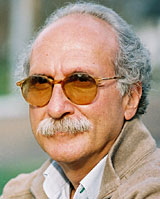Richard Chapman, senior lecturer in the Film & Media Studies Program in Arts & Sciences, is a veteran producer and screenwriter for film and television. Credits include the Golden Globe-nominated HBO film Live from Baghdad, about CNN’s coverage of the Persian Gulf War, which he co-wrote with former CNN producer Robert Wiener; and Shooting the Messengers, a feature-length documentary about how journalists reported the Vietnam War. In all Chapman has written more than 20 motion picture screenplays, including the presidential comedy My Fellow Americans, and written and produced more than 200 hours of network television.

“Television and the internet are creating an American Idol-like atmosphere around the 2008 election. It’s all about personality and narrative and who has the best story, as opposed to who has the best grasp of the issues. Candidates are framed in their most heroic lights: the war hero, the community organizer, the survivor-of-tragedy, the up-by-her-bootstraps hockey mom. These types of semi-mythic personal stories create an illusion of intimacy that plays well on the screen.
“Conventions and debates and major speeches have all become episodes in one giant series called The Campaign, which is equal parts reality TV and soap opera. And, like many reality shows, The Campaign is very well scripted. The producers — also called ‘campaign managers’ — are adept at pulling heartstrings and creating an illusion of spontaneity. It’s an exercise in screenwriting.
“Campaign rhetoric can be contradictory, confusing and misleading, but it’s also colorful and emotionally charged and designed to create a kind of mass emotion in the audience. Even when the story is ‘true,’ the careful staging often shows a mixture of cynicism and strategic planning. ‘Credibility’ becomes a question of performance.
“Network executives and campaign managers are basically looking for the same things: the big twist, the big stunt casting, the big stunt event. They’re also looking at the same demographics: How’s it playing in urban areas? How’s it playing in the rural markets? How’s it playing in different ethnic and socio-economic brackets? Meanwhile the audience swings back-and-forth each week, depending on how well the narrative is written and how well it’s executed by the candidates/performer.”
For media assistance or to arrange an interview through our free VYVX and ISDN lines, please contact:
Liam Otten
Senior News Writer
liam_otten@wustl.edu
(314) 935-8494